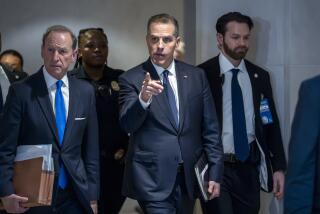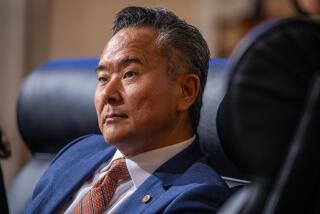Accuse Rep. Dingell of Being Unfair : Deaver Lawyers Upset by Perjury Claims
- Share via
WASHINGTON — Lawyers for President Reagan’s former aide Michael K. Deaver accused a House subcommittee chairman Monday of disregarding fundamental fairness in saying that Deaver possibly committed perjury in testifying about his lobbying activities.
In a sharp letter to Rep. John D. Dingell (D-Mich.), chairman of the Energy and Commerce subcommittee on investigations, the lawyers charged that Dingell had broken with the “customary” practice of allowing witnesses to “correct any ambiguities or seeming inconsistencies” in their testimony.
Deaver’s lawyers, Herbert J. Miller Jr. and Randall J. Turk, contended that Dingell had refused to provide a transcript of their client’s testimony before alleging that their client had perjured himself.
“Given the scope, detail and pace of the subcommittee’s questioning of Mr. Deaver over a period of 5 1/2 hours, such an opportunity was called for,” they said. “Your refusal to make this possible is unjustifiable.”
Won’t Provide Specifics
Miller and Turk asked that Dingell refer the “possible perjury charges” to Whitney North Seymour Jr., a court-appointed independent counsel who is investigating allegations that Deaver violated conflict-of-interest laws in representing Canada and other clients. Dingell and his staff have refused to provide specifics on the perjury allegations.
Deaver’s lawyers called on Dingell and his staff to “refrain from further interference” with Seymour’s investigation. Michael F. Barrett Jr., the subcommittee’s chief counsel, said there would be no reply to the lawyers’ letter until the panel has had time to study it.
The subcommittee is scheduled to vote today on its staff’s allegations that Deaver had been untruthful and its recommendation that the testimony in question be forwarded to the independent counsel.
Meanwhile, a high White House official and Deaver’s lawyers took issue with key details of a published account that Deaver had played a direct role in setting up a meeting last October between Reagan and Kim Kihwan, a low-level trade adviser for South Korea, one of Deaver’s clients. Kim reportedly delivered a letter from South Korean President Chun Doo Hwan asking that the United States relax trade pressures on his country.
The New York Times reported Monday that Deaver’s role in the meeting was being scrutinized by the Dingell subcommittee and by Seymour, who is seeking to determine if criminal charges should be brought against Deaver for any of his lobbying activities.
The newspaper said Deaver may have arranged the Reagan-Kim meeting at the White House in order to impress Korean officials, who about the same time signed two consulting contracts with Deaver for a total of $750,000 a year.
Deaver Involvement Denied
The White House official, who asked that his name not be used, said an investigation by Peter J. Wallison, counsel to the President, found “affirmative evidence” that the meeting had been set up by the South Korean government on the advice of the U.S. Embassy in Seoul through the National Security Council--”with no sign that Deaver was involved.”
The White House official conceded that Deaver may have spoken with Richard L. Walker, the U.S. ambassador to South Korea, about the Reagan meeting. But he emphasized: “There was no involvement by Deaver with the White House to set up the meeting.”
Turk, Deaver’s lawyer, insisted Monday that “the meeting was set up through normal diplomatic channels” and not by Deaver.
A spokesman for Seymour at his New York law office said that the independent counsel would have no comment whatever.
In addition, Turk denied published allegations that Deaver had curried favor with Walker by assuring him that Reagan had no plans to terminate his service in Korea.
The New York Times said such comments would indicate that Deaver was seeking to embellish his role as a private citizen by posing as an official intermediary for Reagan.
The newspaper, concluding a two-month Asian investigation, said it had also turned up allegations that Deaver had sought to pose as an official U.S. representative by discussing sites for last May’s economic summit meeting.
Turk said Deaver had made some suggestions concerning sites and examined some locations “at the request of (Japanese Prime Minister Yasuhiro) Nakasone himself.”
“Mr. Deaver performed this service for the Japanese on a ‘pro bono’ basis and with no compensation whatsoever,” Turk said.
More to Read
Get the L.A. Times Politics newsletter
Deeply reported insights into legislation, politics and policy from Sacramento, Washington and beyond. In your inbox twice per week.
You may occasionally receive promotional content from the Los Angeles Times.










